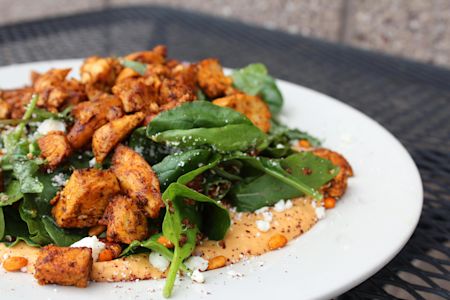10 things I learned going sugar-free for 7 days
I knew the challenge would be tough, but I didn’t expect it to completely change the way I feel.
Sign up to The Body Coach newsletter to get inspiration in your inbox every Monday.

If you’ve seen more posts cropping up on social media about high protein meals or the floods of “high protein”-marketed products in the supermarket, you’re not alone. “High protein” messaging is literally everywhere.
Searches for high protein on Google have more than doubled in the past 5 years since the pandemic – and it doesn’t seem to be slowing down. So why is everyone going on about it now, and should we actually be eating more protein?
Let’s break it down.
First things first, the importance of protein isn’t new. It’s always been a big part of our diet. Protein – in foods like chicken, eggs, Greek yoghurt – is one of the three main nutrients (macronutrients or 'macros'), alongside carbs and fats that give your body the energy it needs to get through the day.
Proteins are said to keep you fuller for longer, which can reduce snacking and help manage weight. There are tons of benefits of protein – it’s basically essential for the repair and maintenance of our bodies, especially our bones and muscles.
"It supports the function and healthy development of our organs such as our brain, heart and liver, the antibodies in our immune system and the haemoglobin that carries oxygen in our blood,” says Bridget Benelam, Nutrition Manager at the British Nutrition Foundation charity.
Good question. There are several key factors:
Firstly, strength training is booming… especially among women. More and more people are becoming increasingly interested in building muscle rather than cardio-only – and protein is essential for this as it supports muscle growth when strength training. Women are less worried about “bulking up” and being strong is becoming something to be admired.
Older adults are becoming more aware of their health. With an ageing population, older adults are learning more about muscle loss (also called sarcopenia) and the link between protein, strength, and independence. So we’re seeing a lot more messaging about protein needs across different ages… i.e. it’s not just for men who lift weights at the gym!
There seems to be more awareness of nutrition since the pandemic. During this time, many people became more aware of moving their body (when suddenly our lives were restricted). Protein was seen as something that was good for immunity and strength, and Google Trends shows spikes in searches for terms related to high protein starting around 2020. A study published in BMC Public Health found people increased exercise at home during the pandemic and cooking more from scratch, to maintain or improve health. Plus, the World Health Organisation were emphasising the importance of a healthy diet in supporting the immune system during the pandemic, which could’ve led to a surge of interest.
And food brands are catching on. Because of the hype and the growing demand for protein, food brands have jumped on the bandwagon, creating “high protein” versions of everything – cereal bars, bread, wraps, you name it. Ultimately, when demand rises, they’ll try to adapt their products.
You could say so, yes. Protein supports so many goals: fat loss, muscle gain, energy, ageing well, and appetite control – and it’s pretty uncontroversial, too.
Our recommended protein intake is based on how much we need per kilogram of our bodyweight – for adults this is 0.75g per kg of bodyweight. Current recommendations are 56g/day for men and 45g/day for women (based on bodyweights of 75kg for men and 60kg for women).
To make that a bit easier to digest, for example:
For many of us, though, we're probably already plenty of protein in our diets, without buying additional snacks or cereals with a “high protein” sticker on the front. It’s a good idea to get protein from a variety of foods, says Bridget, from the British Nutrition Foundation.
Remember, you can get protein from all sorts of foods, like:
If you're training hard or you're older, you might need a bit more.
And for those wondering about protein powder? "For people doing intensive training with a busy schedule, having protein powder may be a convenient way to meet their protein needs, although it is better to try and get this from food where possible as protein-rich food (nuts, seeds, low-fat dairy products (yogurt, milk, cheese), legumes (beans, lentils), fish, poultry, eggs, and lean meat) can also provide you with other important nutrients in your diet," adds Bridget.
Pre-order Joe Wicks' brand-new book, Protein in 15, now.
This article was written by The Body Coach content team.